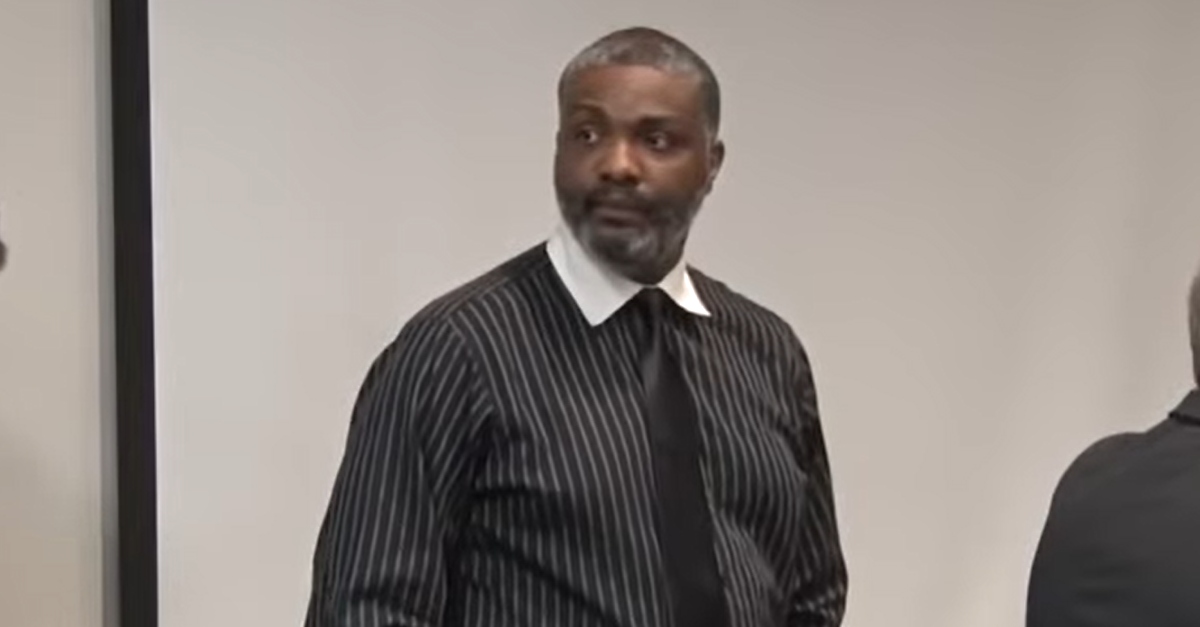
Robert Tyrone Hayes in court shortly before his defense delivered the closing argument in the penalty phase of his trial.
A convicted serial killer will spend life in prison for murdering three women.
Robert Tyrone Hayes, 39, had been convicted of fatally shooting Laquetta Gunther, 45, Julie Green, 34, and Iwana Patton, 35, in a spree of separate incidents from December 2005 to February 2006 in Daytona Beach, Florida. He faces a pending case for allegedly strangling Rachel Elizabeth Bey, 32, who was found dead in Palm Beach County in 2016.
Prosecutors sought the death penalty. After a three-day sentencing hearing, a 12-member jury could not reach a unanimous decision as to whether or not the defendant should, indeed, be put to death by the state. So, a judge sentenced Hayes to three back-to-back life sentences, according to a press release from the office of State Attorney R.J. Larizza.
“While the Death Penalty was not imposed, Hayes will no longer prey on the unsuspecting and vulnerable – he will die in our State Prison System,” Larizza said in a statement. “There is Justice in that.”
Prosecutors called the murders each cold and premeditated. Hayes purchased a gun shortly before killing Gunther, who was found dead in a kneeling position between two buildings on Dec. 26, 2005. He had more than two weeks to reflect before killing Green, who was found dead on Jan. 14, 2006, in a ditch near a construction site. It was more than a month later that he murdered Patton, who was found on Feb. 24, 2006.
All three women were sex workers, and prosecutor Jason Lewis asserted in closing arguments of the penalty phase that Hayes targeted them because he wanted someone who would willingly join him in a desolate location.
In opening statements, prosecutor Andrew Urbanak emphasized the similarities between all three murders: each of the women was naked, they had no ID, and there was no struggle. The prosecution maintained this showed the killings were premeditated.
Gunther’s eldest daughter Guyette Luster said she and her siblings lost out on their chance to grow old with their mother.
Green’s sister Rhonda Iwanski told the court that part of her died with Julie. The murder occurred when another sister of theirs had terminal cancer.
Dr. Anisa Farris, Patton’s niece, read statements on behalf of the family. Patton’s sister described her as caring and someone who kept the peace. A nephew said Patton left an impression because of her smiles.
Attorney Chris Anderson told jurors the defense accepted the guilty verdict. He argued that evidence showed the killings were done in a frenzy, not with premeditation. For example, Hayes, a criminology major, did not take the time to use a condom to prevent leaving behind DNA.
Anderson said in opening statements that nothing he said was meant to diminish the value of human life, but he maintained that there enough mitigation that jurors should recommend life without parole instead of death. Hayes was raised without a father because his dad was murdered. He was a gifted student as a young man, but experienced abuse, the defense said.
Loved ones going back to childhood and college testified that Hayes was supportive and a good friend. The defense even highlighted an incident in which he stayed to make sure a woman was safe when a stranger tried to beat down her door. They maintained he behaved appropriately with women during ordinary circumstances.
The prosecution dismissed all of that. These murders were three independent decisions, and showed the killer’s true character. The court heard Hayes was a good cook and father, but none of this overrides killing and killing and killing, Anderson said.
The prosecution asked defense witnesses under cross-examination if Hayes was a good student, smart, or whether he displayed signs of mental illness or impulsive behavior. In other words, they wanted to suggest he planned these murders instead of acting impulsively.
Hayes friend Latisha Cornelius said Hayes was always a good friend to her. The news of these murders came to her as a shock. It was out of character for him, and not anyone she knew, she said.
[Screenshot via Law&Crime Network]